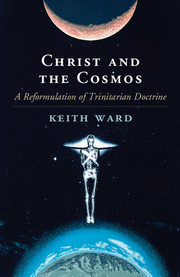Book contents
- Frontmatter
- Contents
- Preface
- Acknowledgements
- PART I THE THREEFOLD NATURE OF THE DIVINE BEING
- PART II THE BIBLICAL SOURCES OF TRINITARIAN THOUGHT
- PART III THE TRINITY, IMMANENT AND ECONOMIC
- 11 Why Three?
- 12 The Trinity and Revelation
- 13 Hegel and Modern Theology
- 14 The Immanent Trinity
- 15 The Identity of the Immanent and the Economic Trinity
- 16 Hegel Again
- 17 What Creation Adds to the Trinity
- 18 The Epistemic Priority of the Economic Trinity
- 19 The Trinity and Naive Realism
- 20 The Trinity and the Cosmos
- 21 Revelation and the Immanent Trinity
- PART IV THE SOCIAL TRINITY
- PART V THE COSMIC TRINITY
- Bibliography
- Subject Index
- Name Index
14 - The Immanent Trinity
from PART III - THE TRINITY, IMMANENT AND ECONOMIC
Published online by Cambridge University Press: 05 September 2015
- Frontmatter
- Contents
- Preface
- Acknowledgements
- PART I THE THREEFOLD NATURE OF THE DIVINE BEING
- PART II THE BIBLICAL SOURCES OF TRINITARIAN THOUGHT
- PART III THE TRINITY, IMMANENT AND ECONOMIC
- 11 Why Three?
- 12 The Trinity and Revelation
- 13 Hegel and Modern Theology
- 14 The Immanent Trinity
- 15 The Identity of the Immanent and the Economic Trinity
- 16 Hegel Again
- 17 What Creation Adds to the Trinity
- 18 The Epistemic Priority of the Economic Trinity
- 19 The Trinity and Naive Realism
- 20 The Trinity and the Cosmos
- 21 Revelation and the Immanent Trinity
- PART IV THE SOCIAL TRINITY
- PART V THE COSMIC TRINITY
- Bibliography
- Subject Index
- Name Index
Summary
Barth would claim to derive the doctrine of the Trinity from Scripture, but he admits that nowhere does Scripture say anything like this. In the Old Testament, usually God refuses to reveal himself (‘No one shall see me and live’, Exodus, 33, 20). God reveals statutes and ordinances, but not Godself. In the New Testament of course Christians see Jesus as a manifestation of God in human form. But can it be credibly said that Jesus reveals everything about the nature of God? If so, why have there been so many arguments about it ever since? If we see Jesus, we see the Father, according to John's Gospel (John 14, 9). But no one thinks, I hope, that the creator of worlds looks like a young Jewish male. The word ‘see’ does imply that we meet the Creator in some form if we truly encounter Jesus. There is a sort of ‘event of encounter’ view at work here, and it is by the aid of the Spirit that we see Jesus as the human form of God. But it is important to say that we do not see God in Jesus clearly and in a form that could never be surpassed – there have been too many interpretations of Jesus as sexist and nationalistic, or as stern and judgmental, or as passive and ascetic, for that to be plausible. Jesus may embody God as fully as any human person could; but we, as individual human beings, do not always see that, for even the Spirit does not work in any of us in such a way that it renders us sinless and perfectly wise.
Barth acknowledges this. He says repeatedly that in speaking of the Trinity ‘we do not know what we are saying’ (Barth, 1936, p. 441). So perhaps he would not castigate me too much for saying that he sometimes says things that might be better left unsaid. What I have in mind specifically here is his insistence that the divine persons exist ‘antecedently’ in themselves, in the way in which they appear to us in revelation. For example, in revelation history the Father loves the Son and the Son obediently loves the Father in return, and the Spirit is the form in and through which Father and Son are inwardly united.
- Type
- Chapter
- Information
- Christ and the CosmosA Reformulation of Trinitarian Doctrine, pp. 102 - 107Publisher: Cambridge University PressPrint publication year: 2015



